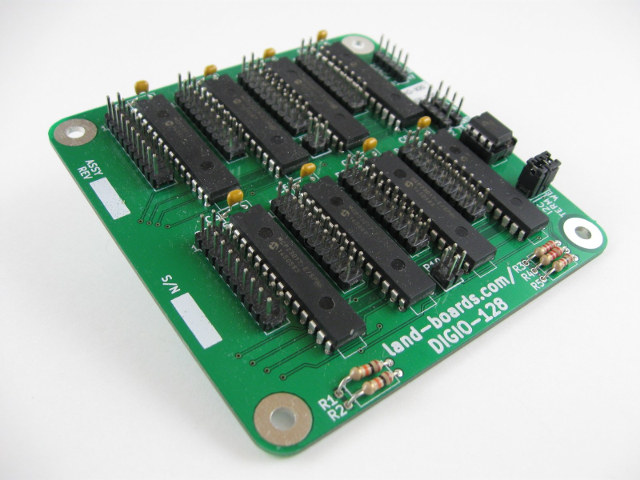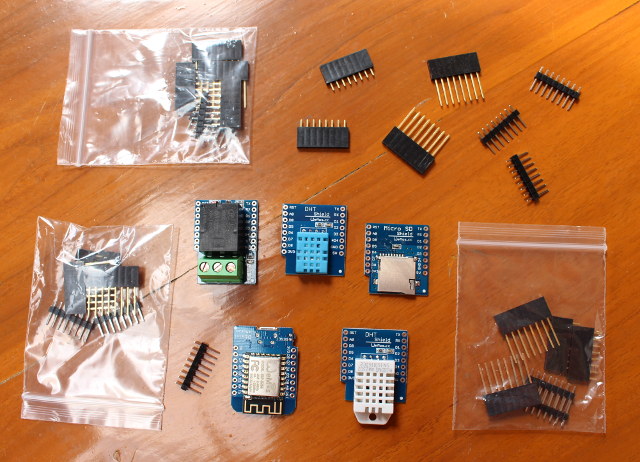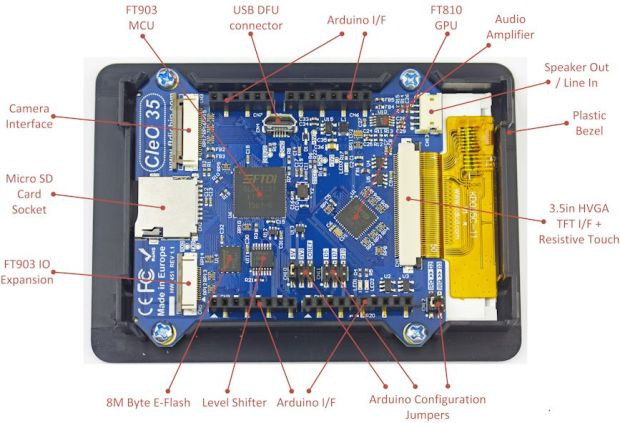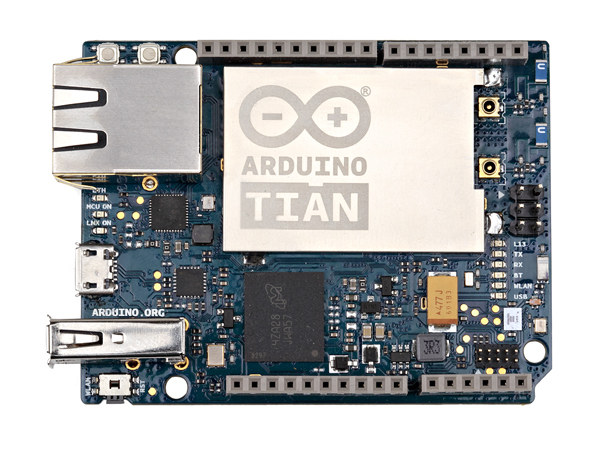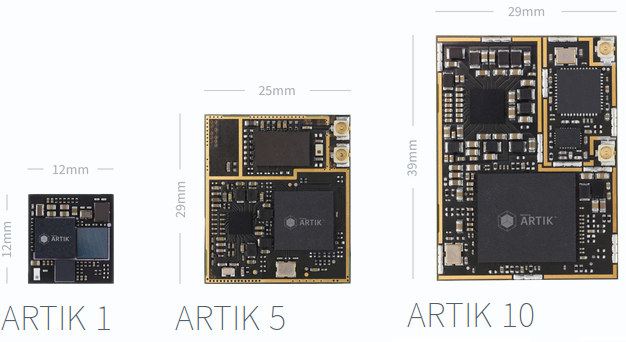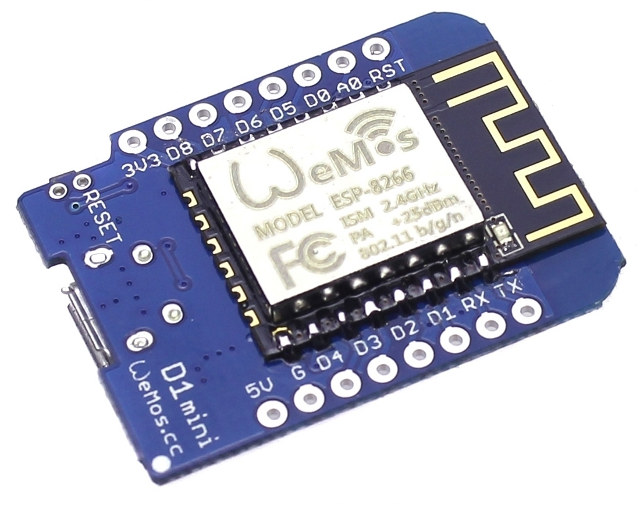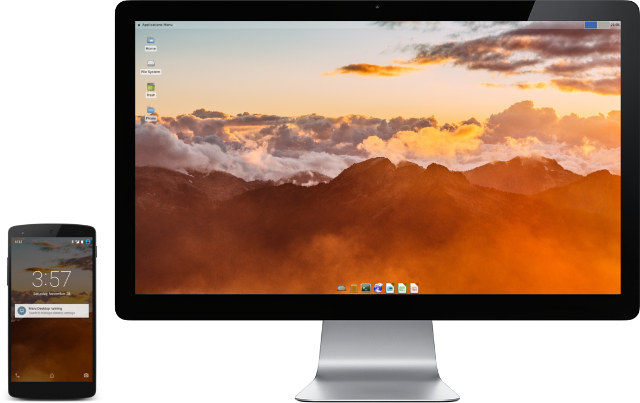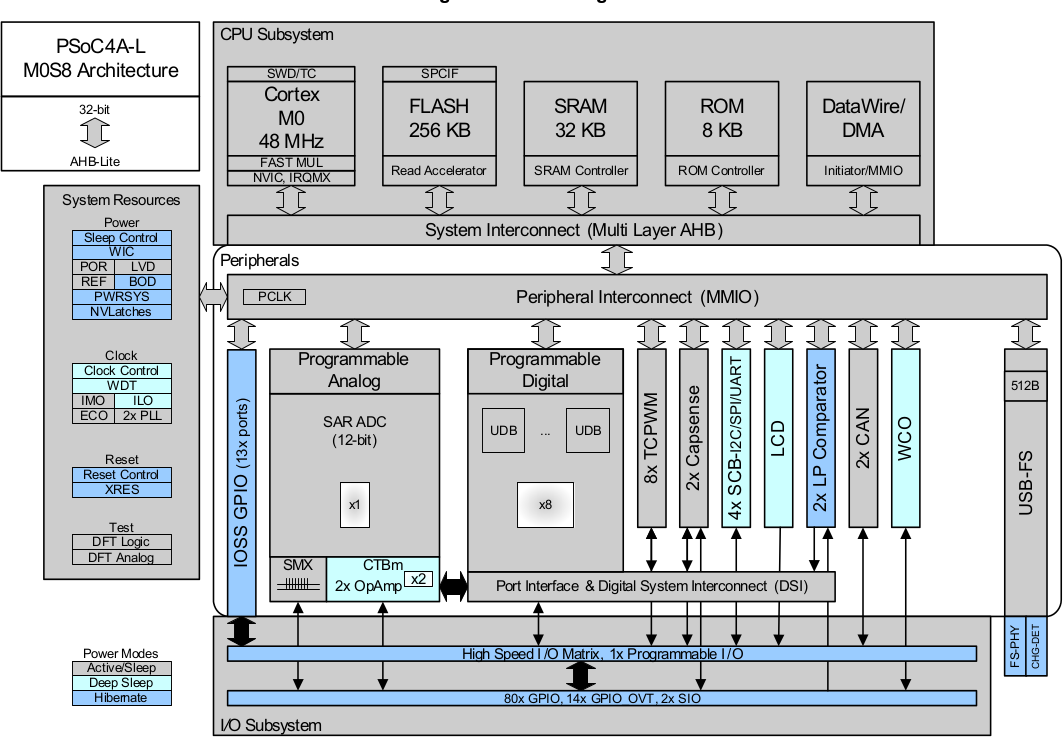If you run out of GPIOs on your board, the easy way is to add an I2C GPIO expander, but those are normally limited to 8 or 16-channels, so Land Boards decided to create a board with 8 IO expanders making it a 128 channel IO expander that works on Raspberry Pi, BeagleBone Black, Arduino, and basically any boards with an I2C hardware or software implementation. DIGIO-128 board specifications: 8x Microchip MCP23017 16-bit I/O expander for up to 128 GPIOs Communication Interface – I2C host interface with 100/400 KHZ operation; 4-pin host interface connector (Ground, Power, Clock, Data) 8x 20-pin 2.54mm pitch connectors with 16 I/Os, 2x VCC, and 2 ground 2x 4-pin interrupt connectors Data Storage – Microchip 24LC024 2K EEPROM with board info. 3.3V or 5V operation Dimensions – 95 x 95 mm You can find out to use the board in the Wiki for code for Raspberry […]
Getting Started with Wemos D1 mini ESP8266 Board, DHT & Relay Shields
Wemos D1 mini is an ESP8266 board that’s interesting thanks to its size, its low price ($4), micro USB power, its shields, and a documentation that looks fairly good. The board can be programmed with Arduino or Lua, and supports both serial and OTA programming. I’ve decided to give it a try and bought the board together with two temperature shields, a relay shield, and micro SD shield. I got all for $ 14.00 from Wemos Aliexpress shop, and it took about one month for delivery. I can also see they’ve recently released a new OLED shield selling for about $5. All shields were shipped inside their own anti-static bags. The pins are clearly marked on both side of the board and the shields. One side of the board features ESP8266 module. and the other side has CH340 serial to USB chip, and the reset button. The provided headers make […]
Cleo35 Touchscreen Display for Arduino UNO Comes with Tutorials and Example Projects (Crowdfunding)
There are already various options to add a (touscheen) display to Arduino board with software support including TFTLibrary for Arduino, and recently I tried Nextion serial touchscreen displays that are supported by a WYSIWYG editor, but the latter is only supported in Windows and not exactly user-friendly, and I found the few provided tutorials would only work with a specific resolution incompatible with the displays I had been sent. So I gave up on the idea of interfacing the display with Arduino or ESP8266 as it would be too time-consuming. FTDI CleO project might be faster and easier to get started, as their CleO35 touchscreen display for Arduino UNO will come with a 20 chapter tutorial covering over 80 topics, and 20 projects to get started. Some of the key features and specs of Cleo35 display include: MCU – FTDI FT903 32-bit FT32 core @ 100MHz with 256kB on-chip Flash […]
Arduino Tian Board Combines Atmel D21 MCU, Atheros AR9342 WiSoC, and CSR8510 Bluetooth 4.0 SoC
Arduino Tian is an update of Arduino Yun board, mainly replacing Atmel ATMega32u4 8-bit MCU and Atheros AR9331 WiSoC with more recent Atmel SAMD21 32-bit Cortex M0 MCU and Atheros AR9342 WiSoC with support for dual band 802.11 b/g/n WiFi, as well as CSR8510 Bluetooth 4.0 SoC. Arduino Tian specifications: MCU part MCU – Atmel SAMD21G18 ARM Cortex-M0 MCU @ 48 MHz with 256KB flash and 32KB SRAM Digital I/O Pins – 20x GPIOs with 12x PWM and UART Analog Input Pins – 6x 12-bit ADC channels Analog Output Pins – 1x 10-bit DAC DC Current per I/0 – 7mA Operating Voltage – 3.3V “Linux” SoC part SoC – Atheros AR9342 MIPS74Kc processor @ 535 MHz System Memory 64MB DDR2 Storage – 16 MB Flash for firmware, 4 GB eMMC Flash for data Connectivity – 10/100M Ethernet, dual band 802.11n 2×2 2.4/5 GHz WiFi, Bluetooth 4.0 + EDR (CSR8510) USB […]
Samsung Artik IoT Boards and Devkits with WiFi, Bluetooth LE, and Zigbee Available, Partners Announced
Samsung Artik IoT boards will finally start selling on February 22 via Digikey. With the many fascinating developments in the IoT space over the year, you’d be forgiven if you completely forgot about Samsung Artik boards. So let’s have a quick recap. The Korean company previously announced three boards all supporting Bluetooth LE: Artik 1 – Ineda Systems Dual Core microAptiv MIPS32 processor with 1MB on-chip RAM, no GPU, and 4MB SPI flash Artik 5 – Dual core Exynos ARM processor @ 1GHz with ARM Mali 400 MP2 GPU, 512MB RAM and 4GB eMMC flash (both on-chip), with WiFi & Zigbee/Thread connectivity Artik 10 – Octa core Exynos processor with 4x ARM Cortex A15 @ 1.3GHz, 4x ARM Cortex A7 @ 1.0 GHz with ARM Mali-T628 GPU, 2GB LPDDR3 (on-chip), 16GB eMMC flash, and WiFi & Zigbee/Thread connectivity Samsung also partnered with multiple companies working on: Operating Systems – Tizen, […]
$4 Wemos D1 mini ESP8266 Board Supports Shields with a Temperature Sensor, a Button, a Relay, or a micro SD slot
Wemos D1 board, a $9 ESP8266 board in Arduino UNO form factor, now has a little brother with Wemos D1 mini. The board looks somewhat similar to NodeMCU with breadboard friendly I/Os on the sides and a micro USB port for power and programming, but what could make it more interesting, beside the $4 price tag, is that the company also developed several shields (aka add-on boards). Wemos D1 mini specifications: WiFi 802.11 b/g/n module based on ESP8266EX with 4MB flash Expansion – Through holes with 11x digital input/output pins (3.3V) supporting interrupt/PWM/I2C/one-wire (except D0) 1x analog input (3.3V max input) Reset and power signals (5V, 3.3V, GND) USB – micro USB port Misc – Reset button Power – 5V via micro USB or 5V pin Dimensions – 34.2 x 25.6 mm Weight – 10 grams The board is said to be compatible with Arduino IDE and NodeMCU firmware. ESP8266 […]
Open Source Operating Systems News – Maru OS, Zephyr, ReactOS, Tizen 3.0, and Raspbian
There have been several news related to open source operating systems in the last couple of weeks including Maru OS to run Debian on Android, Zephyr Project real-time OS managed by the Linux Foundation, ReactOS an open source port of Windows XP, and Raspberry Pi boards are getting a Tizen 3.0 port, as well as a new Raspbian release. Maru OS – Mobile <-> Desktop Convergence Maru OS mobile operating system is supposed to do what Ubuntu convergence promised: it runs in mobile mode on the go with Android Lollipop mobile OS, once you connect the phone to an HDMI screen, and pair Bluetooth keyboard and/or mouse, it will switch to desktop mode running Debian Linux. The downside is that so far it a single developer (Preetam D’Souza) worked on it, and the beta version only works on Nexus 5 smartphone. However, since the project went viral, dozen of other […]
Cypress Introduces PSoC 4 L-Series ARM Cortex-M0 MCU and Development Kit
Cypress Semiconductor has recently unveiled PSoC 4 L-Series micro-controller family based on ARM Cortex M0 core with more programmable analog and digital blocks, expanded memory, new peripherals and higher number of I/Os, as well as the corresponding Arduino compatible CY8CKIT-046 PSoC 4 L-Series Pioneer Kit to evaluate their latest solution. Key features of PSoC 4 L-Series MCU ARM Cortex-M0 CPU @ 48-MHz with DMA controller, up to 256KB flash, up to 32KB SRAM and up to 98 GPIOs CapSense with SmartSense auto-tunning – 2x Cypress Capacitive Sigma-Delta (CSD) blocks Programmable analog 4x configurable opamps 4x current DACs (IDACs) 2x low-power comparators (CMP) One 12-bit, 1-Msps SAR ADC Programmable digital 8x Universal Digital Blocks (UDBs) 8x configurable 16-bit TCPWM 4x independent serial communication blocks (SCBs) Full-Speed USB 2.0 controller 2x CAN Controllers Segment LCD Drive support up to a maximum of 64 output (commons or segments) Power 1.71 to 5.5 V […]


